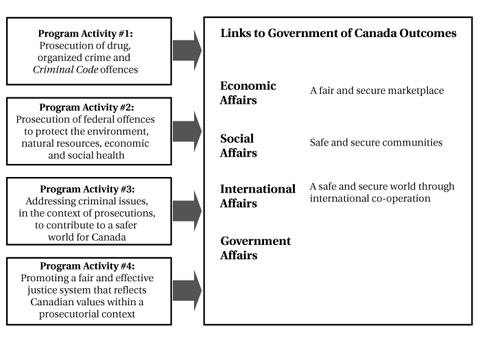Common menu bar links
Breadcrumb Trail
ARCHIVED - Office of the Director of Public Prosecutions
 This page has been archived.
This page has been archived.
Archived Content
Information identified as archived on the Web is for reference, research or recordkeeping purposes. It has not been altered or updated after the date of archiving. Web pages that are archived on the Web are not subject to the Government of Canada Web Standards. As per the Communications Policy of the Government of Canada, you can request alternate formats on the "Contact Us" page.
Section I – Overview
Message from the Attorney General of Canada
In its first year of operation, the Public Prosecution Service of Canada (PPSC) continued to deliver on the federal government’s commitment that criminal offences under federal jurisdiction be prosecuted in a manner that is independent,
transparent and accountable.
government’s commitment that criminal offences under federal jurisdiction be prosecuted in a manner that is independent,
transparent and accountable.
This Report on Plans and Priorities outlines how the PPSC is working to continue delivering prosecutorial services while dealing with the challenges and risks affecting all participants in the criminal justice system.
While delivering professional, independent prosecution services and advice on behalf of the federal Crown, the PPSC has identified priority areas that reinforce its operational role, while supporting the government’s objectives related to Making Canada Safer. The PPSC operates to advance its priorities, its strategic outcome and four program activity areas.
Together with its federal, provincial, territorial and international partners, I am confident the PPSC will continue tackling crime, while demonstrating the transparency, prosecutorial excellence, and independence for which it has already become known.

The Honourable Robert Douglas Nicholson
Attorney General of Canada
Management Representation Statement
I submit for tabling in Parliament, the 2008-09 Report on Plans and Priorities for the Public Prosecution Service of Canada.
submit for tabling in Parliament, the 2008-09 Report on Plans and Priorities for the Public Prosecution Service of Canada.
This document has been prepared based on the reporting principles contained in the Guide for the Preparation of Part III of the 2008–09 Estimates: Reports on Plans and Priorities and Departmental Performance Reports:
- It adheres to the specific reporting requirements outlined in the Treasury Board of Canada Secretariat guidance;
- It is based on the organization’s strategic outcome and Program Activity Architecture that were approved by the Treasury Board;
- It presents consistent, comprehensive, balanced and reliable information;
- It provides a basis of accountability for the results achieved with the resources and authorities entrusted to it; and
- It reports finances based on approved planned spending numbers from the Treasury Board of Canada Secretariat.

Brian Saunders
Acting Director of Public Prosecutions
Summary Information
This Report on Plans and Priorities (RPP) presents concise information on the Public Prosecution Service of Canada’s plans and priorities and resources for fiscal year 2008-09 that contribute to the achievement of its strategic outcome and expected results.
Raison d'être
The mandate of the Public Prosecution Service of Canada (PPSC) is to provide prosecutorial advice and litigation support to law enforcement agencies, and to act as prosecutor on all matters prosecuted by the Attorney General of Canada on behalf of the Crown. The PPSC’s sole strategic outcome is the prosecution of criminal offences under federal law in a manner that is independent of any improper influence and respects the public interest.
The PPSC undertakes key duties on behalf of the Attorney General of Canada. These key duties, to be carried out in an objective and non-partisan manner, are:- The duty to act independently in making decisions related to criminal prosecutions – This is a constitutional principle which recognizes that decisions to prosecute, stay proceedings or launch an appeal must solely be made in accordance with legal criteria which include taking into account the public interest, but not considerations of a partisan political nature.
- The duty to act independently in providing prosecution-related legal advice – Prosecution-related advice to law enforcement and other federal investigative agencies is provided in a timely and impartial manner. Among the considerations which inform the legal advice are the policy objectives of the legislation in respect of which the advice is being sought.
The PPSC prosecutes cases under federal statutes where charges are laid by federal police, other federal investigative agencies, RCMP contract police, as well provincial and municipal police forces.
The PPSC’s prosecution-related and advisory work is part of the criminal justice continuum, which includes investigative agencies, law enforcement, courts and other components of the criminal justice system. Prosecution-related advice during police investigations, particularly large-scale investigations, is crucial to ensure that investigative techniques and procedures conform with the evolving rules of evidence and the protections found in the Canadian Charter of Rights and Freedoms. The advantage of early prosecutorial advice includes reducing the risk that operational decisions, such as those relating to methods of obtaining evidence, will detrimentally affect the admissibility of evidence at trial.Benefits to Canadians
The PPSC plays an integral role in the criminal justice system, promoting the values enshrined in the Charter and working to safeguard the rights of all those who come into contact with the criminal justice system. The benefits to Canadians from the work carried out by the PPSC include:
- Promotion of effective investigations, the rule of law, and respect for the rights of Canadians through the provision of pre-charge legal advice to investigative agencies;
- Appropriate enforcement of Canada's organized crime and drug laws, regulatory laws and the Criminal Code, through principled and independent decisions by prosecutors; and
- Confidence in the administration of justice through professionally conducted prosecutions that result in a judicial determination on the merits of the evidence.
Alignment with the Government of Canada Outcomes
The Government of Canada’s performance reporting framework consists of thirteen outcomes grouped under four spending areas: Economic, Social, International and Government Affairs. The figure below illustrates how the PPSC’s four program activities are linked to Canada’s performance. Table 1 in Section III provides information on the links between the PPSC’s planned spending and the Government of Canada outcomes. (For more information on the “Whole of Government Framework”, refer to http://www.tbs-sct.gc.ca/rma/krc/).
PPSC’s Contribution to Canada’s Performance
Resource Summary
Financial and human resources for the organization over the planning period are summarized below.
| Total Financial Resources, 2008-09 to 2010-11 (Planned Spending in $ millions) | ||
|
2008-09
|
2009-10
|
2010-11
|
|
148.4
|
138.2
|
143.6
|
| Total Human Resources, 2008-09 to 2010-2011 (Full Time Equivalents) | ||
|
2008-09
|
2009-10
|
2010-11
|
|
751
|
776
|
807
|
The Organization
The Public Prosecution Service of Canada (PPSC) is a relatively small organization with 889 FTEs (an organization chart is provided in Section III). As a national prosecution service, it provides services through a network of offices located in every region of Canada. The majority of its employees are prosecutors. They are supported by other professionals including senior managers, paralegals, administrators, and corporate services staff. In addition, the PPSC employs the services of private sector agents in regions where it is more cost-effective than to have an office or counsel on travel status, or where the demand for prosecution services exceeds available staff resources. The PPSC currently retains or contracts with some 230 standing agent firms across Canada, representing approximately 800 individually appointed counsel.
Reporting Framework
Consistent with guidance provided by the Treasury Board of Canada Secretariat, this 2008-09 Report on Plans and Priorities and the accompanying financial tables are presented using the Government’s Program Activity Architecture (PAA) Framework.
Under its PAA, the PPSC has one Strategic Outcome:
Prosecute criminal offences under federal law in a manner that is independent of any improper influence and respects the public interest.
Four program activities are linked to this Strategic Outcome:
- Prosecution of drug, organized crime and Criminal Code offences.
- Prosecution of federal offences to protect the environment, natural resources, economic and social health.
- Addressing criminal issues, in the context of prosecutions, to contribute to a safer world for Canada.
- Promoting a fair and effective justice system that reflects Canadian values within a prosecutorial context.
Section II provides details on each of these program activities. The table below links PPSC program activities and planned spending in each area.
| Program Activities by Strategic Outcome | ||||
| Strategic Outcome: Prosecute criminal offences under federal law in a manner that is independent of any improper influence and respects the public interest | ||||
| Program Activities |
Planned Spending
($ millions) |
Link between PPSC Priorities and Program Activities |
||
|
2008-09
|
2009-10
|
2010-11
|
||
| 1. Prosecution of drug, organized crime and Criminal Code offences. |
120.6
|
112.6
|
118.4
|
Priorities 1, 2, 3 and 4
|
| 2. Prosecution of federal offences to protect the environment, natural resources, economic and social health. |
18.8
|
17.5
|
17.5
|
Priorities 1, 2, 3 and 4
|
| 3. Addressing criminal issues, in the context of prosecutions, to contribute to a safer world for Canada. |
6.2
|
5.6
|
5.6
|
Priorities 1, 2, 3 and 4
|
| 4. Promoting a fair and effective justice system that reflects Canadian values within a prosecutorial context. |
2.8
|
2.5
|
2.1
|
Priorities 3 and 4
|
| Total |
148.4
|
138.2
|
143.6
|
|
Operational Trends
The PPSC worked on a total of 63,801 litigation files[1] in 2006-07, compared to 61,749 litigation files in 2005-06, a year-over-year increase of 3%. Of this total, approximately 85% related to the prosecution of drug, organized crime, and Criminal Code offences; 10% involved the prosecution of federal offences to protect the environment, natural resources, economic and social health; 1% addressed criminal issues related to contributing to a safer world for Canada; and, the remaining 4% focused on related litigation issues. For 2007-08, the projected total number of litigation files is approximately 70,000.
A number of factors have contributed to the growth in the PPSC’s workload. For example, the RCMP and other police forces are increasing their resources in all regions of the country. This has resulted in an increase in the number of prosecutions undertaken by the PPSC, particularly in drug files.
The increasing volume does not tell the entire story. A small percentage of highly complex cases absorbs a disproportionate share of the total resources of the PPSC. By way of example, cases relating to organized crime represented less than 3% (or 945 cases) of the litigation caseload in 2006-07 but 24% of the litigation time of PPSC counsel and paralegals (or close to 130,000 hours). A relatively small change in the number of organized crime cases, in response to strengthened law enforcement efforts across Canada, has a disproportionate impact on the demand for prosecutorial resources. A single mega-case can absorb more prosecutorial resources than a thousand low-complexity cases.[1] The count of litigation files includes the main file relating to each case, based on data extracted from the PPSC’s case management system. This includes all files worked on by in-house counsel and paralegals as well as legal agents.
External and Internal Influences Facing the PPSC
The PPSC is subject to a variety of external and internal influences, described below.
International crime networks: The globalization of crime networks has introduced new and powerful dangers to national and global security. These networks are involved in organized crime, trafficking in human beings, telemarketing fraud, money laundering and drug trafficking. International criminal networks exploit national borders in an attempt to thwart the efforts of authorities in their battle to prevent trans-national crime. This new world reality has made it imperative for the PPSC and other organizations to work more effectively with provincial and international partners to challenge the serious threats posed by these international criminal networks, to uphold the rule of law, and to enhance safety and security at home and abroad.
Government initiatives: The PPSC has an important role to play in supporting several government initiatives announced in Budgets 2006 and 2007 and in the most recent Speech from the Throne. These initiatives include ensuring the integrity of all components of the federal justice system, tackling crime and strengthening the security of Canadians.
Workload and rising operational costs: As noted above, the PPSC’s workload is increasing. Because the PPSC’s workload is generated by police forces laying charges under federal statutes, it is largely based on police decisions regarding investigative priorities, tactics and allocation of resources. Increases in drug enforcement or policing resources significantly affect the nature and volume of the PPSC caseload. Similarly, changes in police tactics to focus on the upper echelons of organized crime groups to maximize deterrence, disruption and dismantling rather than on individuals in the lower ranks, affect the complexity and cost of prosecutions. The cost of prosecuting organized crime and mega-cases is far greater than that of prosecuting simple possession drug cases, since the former types of cases often involve multiple accused and charges, complex evidence (both factually and legally), international considerations, extensive disclosure and thus result in numerous pre-trial applications.
The North: As noted above, crime rates in the North are on average 4 times higher than in the rest of Canada. In response to high crime rates in the territories, police resources are being increased. This leads to an increased number of police investigations which have a direct impact on the PPSC’s volume of work in the North. Crown prosecutors working in the North face stressful working conditions and pressures that are associated with the remoteness of the communities, and the socio-economic conditions that give rise to the higher crime rates. Crown counsel and Crown witness coordinators involved in the prosecution of violent crimes are often susceptible to vicarious trauma when involved in the prosecution of such crimes. Working in the North also places extra pressure on Crown prosecutors who travel often for circuit courts, and who can be left stranded and separated from their families for extended periods because of extreme and unexpected weather conditions.
Competition for scarce resources: The salaries of prosecutors and lawyers in some regions of Canada continue to increase, which affects the PPSC’s ability to retain its highly skilled prosecutors. These higher salary levels also have an effect on the PPSC’s ability to retain the services of experienced and qualified legal agents. This is of concern, because when personnel shortages occur, the PPSC traditionally has relied on legal agents to ensure its important prosecutorial work is not affected.
Security: Security threats are an ongoing concern for staff, and the PPSC has established a Security Committee to ensure that appropriate security measures are in place to protect its prosecutors and other employees.
Federal/provincial/territorial cooperation within the prosecution community: There are shared issues and challenges faced by the federal and provincial prosecution services, which are considered collaboratively by the Federal/Provincial/Territorial Heads of Prosecutions Committee. The Committee works to promote inter-jurisdictional cooperation and assistance on questions and concerns relating to operational issues arising in organized crime and proceeds of crime prosecutions, issues relating to retaining the services of expert witnesses, concurrent jurisdiction matters, and prosecutor training and security, to name a few. This collaboration contributes significantly to the PPSC’s ability to carry out its mandate.
Provision of Support Services: At the moment, the PPSC is still largely dependent on the Department of Justice for transactional services in the areas of human resources and financial management as well as information technology and information management. As the PPSC builds capacity in these areas, this dependency will decrease.
